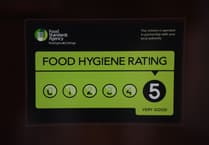More than 10,000 potholes were recorded on Carmarthenshire’s roads last year, nearly twice the number than in 2023.
Pothole numbers averaged around 2,000 per year for a while in the county before reaching 6,055 in 2023. The recorded figure for 2024 was 10,114.
“The increase in potholes is as a result of sustained low levels of investment in preventative maintenance,” said a highway asset management plan which was discussed by a Carmarthenshire Council scrutiny committee.
“This trend is expected to continue as the long-term impacts of under-investment results in further road deterioration.”
The asset plan said the road maintenance backlog now stood at £77 million.
Cllr Gareth Thomas said the report made “very difficult reading”.
Chris Nelson, the council’s highway asset manager, attributed some of the increase in recorded potholes to improved reporting.
The asset plan said there was no Welsh Government grant for road repairs in 2024-25 and no indication of one for 2025-26 as yet. The council is, however, working on a bid for a different Welsh Government pot of money called the resilient roads fund.
The asset plan said the council needed to spend £8 million per year to maintain the road network, which is the second largest of Wales’s 22 local authority areas, in a “stand-still” condition.
In 2023-24 the council spent £1.6 million of capital funding on road maintenance, and £1.3 million of revenue funding on patching and repairs. Its expenditure on roads and transport, said the report, was the second lowest per kilometre in Wales.
Based on current funding levels, the proportion of roads estimated to be in a poor condition in Carmarthenshire is predicted to increase from 10% currently to 23% in a decade’s time.
The asset plan also said 18% of surveyed road drains were blocked or compromised in some way, while 7% had major defects or were not fit for purpose.
Pothole repair work has been stepped up though, with teams fixing nearly 4,400 defects between October 2023 and March 2024. The council has also made savings by revising its winter gritting regime, cutting gritter numbers from 13 to 11, and spreading less road salt.
Councillors said they were worried about cuts to road sweeping and gully cleaning that are planned as part of wider savings measures for 2025-26.
Council chiefs have set aside £320,000 to address people’s concerns about the 2025-26 budget plans, and the committee said the highways department should be allocated some of this to avoid having to make cuts.
Cllr Aled Vaughan Owen, cabinet member for climate change, decarbonisation and sustainability, said the committee would need to come up with alternative proposals if it didn’t think any of the savings measures should go ahead.
Referring to the proposed savings, Mr Nelson said: “The last thing we want to be doing is cutting road sweeping and gully emptying because we know how much value that provides. However, efficiencies have to be made, so we have to target resources as best as we can.”





Comments
This article has no comments yet. Be the first to leave a comment.